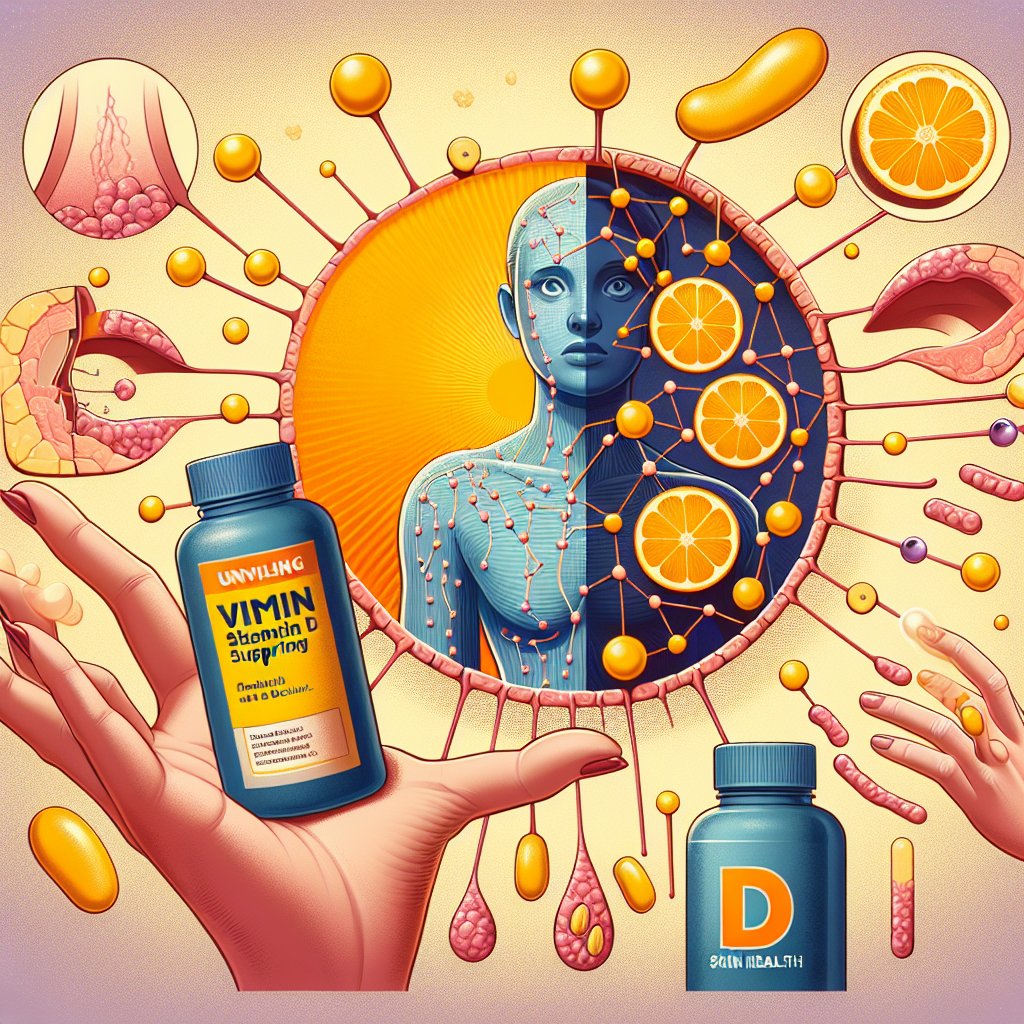Does Vitamin D Cause Acne? Unveiling the Surprising Link Between Vitamin D Levels and Skin Health!
Does Vitamin D Cause Acne?
Hey there, keto beauties! Today, we’re diving into a fascinating and perhaps surprising topic: the link between vitamin D and our skin health, particularly in relation to acne. We all know that vitamin D is essential for our overall health and well-being, but could it also be affecting the health of our skin? Let’s explore this intriguing question together and uncover the truth behind the potential effects of vitamin D on acne.

What is Vitamin D?
Vitamin D is an essential fat-soluble vitamin that plays a crucial role in several functions within the body. It is often referred to as the “sunshine vitamin” because our bodies can produce it when exposed to sunlight. However, it is also found in certain foods and supplements.
Vitamin D exists in a few different forms, but the two most vital ones for humans are D2 (ergocalciferol) and D3 (cholecalciferol). D3 is the type our skin synthesizes from sunlight, while D2 is found in some plant-based sources.
Within the human body, vitamin D serves several important functions, including regulating the absorption of calcium and phosphorus, maintaining healthy bones and teeth, supporting the immune system, and aiding in cell growth and repair.
Studies have also suggested a potential link between vitamin D and skin health, specifically in relation to conditions like acne. Let’s explore further to understand the surprising connection between vitamin D levels and skin health.
The Link Between Vitamin D and Acne
You may have heard about the potential connection between vitamin D levels and acne, and it’s a fascinating area of research that has garnered considerable attention in recent years. So, does vitamin D cause acne? Let’s delve into the existing studies and research to uncover the surprising link between vitamin D and skin health.
Several studies have explored the potential impact of vitamin D on acne. One study published in the journal PLOS One found that individuals with acne tend to have lower vitamin D levels compared to those with clear skin. The research suggested that vitamin D might play a role in regulating inflammation and sebum production in the skin, both of which are key factors in the development of acne.
Another study in the Journal of Clinical and Aesthetic Dermatology highlighted the potential anti-inflammatory properties of vitamin D and its ability to modulate the skin’s immune response, which could be beneficial for managing acne.
Moreover, vitamin D is known to exert antimicrobial effects, which may help in reducing acne-associated bacteria and preventing the formation of blemishes.
While these findings are intriguing, it’s essential to note that more research is needed to establish a definitive causal relationship between vitamin D levels and acne. However, ensuring adequate vitamin D levels through safe sun exposure and dietary sources or supplements can contribute to overall skin health and potentially aid in managing acne.
So, does vitamin D cause acne? The existing research suggests a potential link, but more studies are required to fully elucidate the complex relationship between vitamin D and acne.

Benefits of Vitamin D for Skin Health
Let’s talk about the sunny side of Vitamin D! This little powerhouse not only supports our immune function but also plays a crucial role in maintaining healthy skin. Research has revealed the numerous positive effects that Vitamin D can have on our skin health, making it a crucial nutrient for a radiant complexion.
Supporting Immune Function
One of the most exciting benefits of Vitamin D for skin health is its role in supporting our immune function. Strong immune function is essential for healthy, glowing skin, as it helps to protect against pesky breakouts and infections.
Reducing Inflammation
Vitamin D also has powerful anti-inflammatory properties. Inflammation is a common culprit behind skin issues like acne, eczema, and psoriasis. By reducing inflammation, Vitamin D can help in managing these skin conditions effectively, promoting clearer and smoother skin.
So, bask in the sunlight (don’t forget your SPF!) or load up on Vitamin D-rich foods to enjoy these fantastic benefits for your skin!
Can Vitamin D Cause Acne?
There has been a lot of buzz about the potential link between vitamin D and acne, but what does the scientific evidence reveal? Let’s delve into this intriguing question and uncover the facts.
Contrary to popular belief, scientific research suggests that vitamin D is unlikely to cause or exacerbate acne. In fact, a study published in the Journal of Investigative Dermatology found that vitamin D could potentially help in the management of acne. The study revealed that vitamin D has anti-inflammatory effects, which could assist in reducing acne symptoms.
Another research published in the PLOS One journal indicated that vitamin D deficiency might be associated with an increased risk of developing acne. This suggests that optimizing vitamin D levels could be beneficial for skin health and may help in preventing acne breakouts.
While more in-depth research is needed to fully understand the relationship between vitamin D and acne, current evidence points towards the potential benefits of maintaining adequate vitamin D levels for healthy and clear skin.

Factors Influencing Acne Development
When it comes to acne, it’s not just about genetics. There are several other factors known to contribute to acne development, and these can vary from person to person.
Research has shown that hormonal imbalances play a significant role in acne development. Fluctuations in hormones can lead to increased sebum production, which can clog pores and contribute to acne. For example, an excess of androgens, commonly known as male hormones, can lead to acne flare-ups.
Diet is another crucial factor in acne development. Some studies have suggested a link between high-glycemic diets and acne. Foods that are high in refined sugars and carbohydrates can spike blood sugar levels, leading to increased insulin production, which in turn can stimulate oil production and contribute to acne. Additionally, dairy consumption has also been associated with an increased risk of acne development.
Furthermore, skincare habits can impact acne. Using harsh or pore-clogging skincare products can worsen acne, while gentle, non-comedogenic products can help keep the skin clear.
Understanding these contributing factors can empower individuals to make informed choices about their lifestyle, diet, and skincare routine to manage and potentially prevent acne, alongside exploring the relationship between vitamin D levels and skin health.
Balancing Vitamin D Intake for Skin Health
While maintaining optimal Vitamin D levels is essential for overall health, it’s equally important to take care of your skin to prevent acne. Here are some recommendations on how to strike a balance:
Get Safe Sun Exposure
The sun is a natural source of Vitamin D, so getting moderate sun exposure is beneficial. However, it’s important to be mindful of the time spent in the sun to avoid skin damage. Aim for around 10-30 minutes of sun exposure on your arms, legs, abdomen, and back without sunscreen a few times per week.
Consume Vitamin D-Rich Foods
Incorporate Vitamin D-rich foods such as fatty fish, egg yolks, and fortified dairy products into your diet to support your Vitamin D levels. Including these foods in your meals can help maintain adequate Vitamin D without relying solely on sun exposure.
Use Non-Comedogenic Sunscreen
When spending extended periods in the sun, it’s crucial to protect your skin from harmful UV rays. Opt for a non-comedogenic sunscreen, which won’t clog your pores and contribute to acne. Look for a broad-spectrum sunscreen with an SPF of 30 or higher to shield your skin.
By balancing sun exposure, dietary intake, and sun protection, you can support optimal Vitamin D levels while taking care of your skin to prevent acne.
Summarizing the Surprising Truth About Vitamin D and Acne
After delving deep into the fascinating connection between Vitamin D and acne, it’s evident that the relationship is far from simple. The belief that Vitamin D causes acne has long been a subject of debate and curiosity. However, our exploration has unveiled some intriguing findings that shed light on the complex interplay of Vitamin D levels and skin health.
The Bottom Line
Emerging scientific research suggests that Vitamin D does not directly cause acne. In fact, it appears to exert beneficial effects on skin health. Studies have shown that Vitamin D possesses anti-inflammatory and antimicrobial properties, which can be particularly beneficial for individuals dealing with acne.
Exploring the Nuances
While Vitamin D may not be the villain behind acne, there are other factors to consider. For instance, excessive sunlight exposure leading to Vitamin D toxicity can result in skin issues. Additionally, research indicates that Vitamin D insufficiency or deficiency might exacerbate certain skin conditions, possibly impacting the severity of acne.
Striking a Balance
In essence, the key lies in striking the right balance. Incorporating Vitamin D-rich foods or supplements into a balanced diet, along with sensible sun exposure, can contribute to overall skin health. It’s essential to consult a healthcare professional to determine the optimal Vitamin D levels for individual needs.
In conclusion, while the direct link between Vitamin D and acne remains inconclusive, maintaining adequate Vitamin D levels through a balanced approach appears to be beneficial for skin health.
Now that we’ve uncovered the surprising truth about Vitamin D and acne, let’s explore how to optimize Vitamin D levels for healthy and radiant skin.


